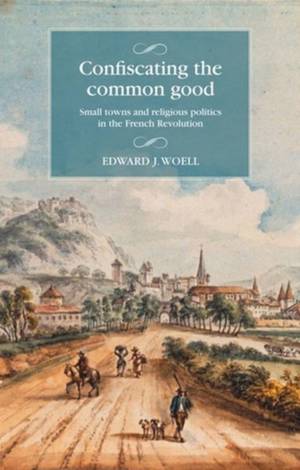
Je cadeautjes zeker op tijd in huis hebben voor de feestdagen? Kom langs in onze winkels en vind het perfecte geschenk!
- Afhalen na 1 uur in een winkel met voorraad
- Gratis thuislevering in België vanaf € 30
- Ruim aanbod met 7 miljoen producten
Je cadeautjes zeker op tijd in huis hebben voor de feestdagen? Kom langs in onze winkels en vind het perfecte geschenk!
- Afhalen na 1 uur in een winkel met voorraad
- Gratis thuislevering in België vanaf € 30
- Ruim aanbod met 7 miljoen producten
Zoeken
Confiscating the Common Good
Small Towns and Religious Politics in the French Revolution
Edward Woell
€ 193,45
+ 386 punten
Omschrijving
Comprising five microhistories, this book proposes that the French Revolution's religious politics in small towns weakened democratic society to such an extent that it precluded political democracy. It details two revolutionary dynamics that damaged the civic life of small towns: social polarisation and the loss of local institutions that had been a source of social capital as well as a common good. Detailed narratives about Pont-à-Mousson, Gournay-en-Bray, Vienne, Haguenau and Is-sur-Tille also reveal that contrary to the view upheld by many scholars, small-town religious politics extended far beyond the pivotal Ecclesiastical Oath of 1791. Other developments -- the nationalisation of Church property, the dissolution of religious orders, and the elimination of bishoprics, chapters, parishes and collegial churches -- also adversely affected the wellbeing of these small urban communities not only in the Revolution but also in the two centuries that followed.
Specificaties
Betrokkenen
- Auteur(s):
- Uitgeverij:
Inhoud
- Aantal bladzijden:
- 304
- Taal:
- Engels
- Reeks:
Eigenschappen
- Productcode (EAN):
- 9781526159137
- Verschijningsdatum:
- 2/08/2022
- Uitvoering:
- Hardcover
- Formaat:
- Genaaid
- Afmetingen:
- 140 mm x 216 mm
- Gewicht:
- 535 g

Alleen bij Standaard Boekhandel
+ 386 punten op je klantenkaart van Standaard Boekhandel
Beoordelingen
We publiceren alleen reviews die voldoen aan de voorwaarden voor reviews. Bekijk onze voorwaarden voor reviews.









